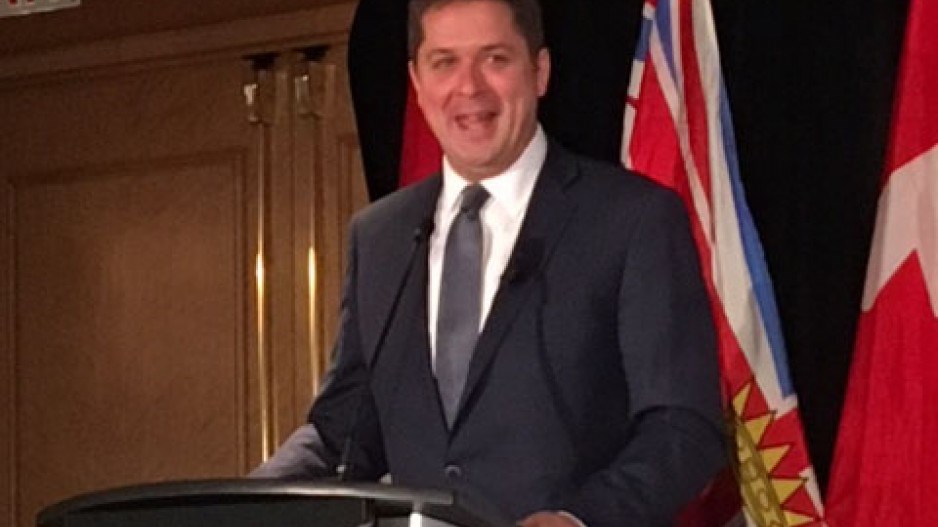When it comes to defending the interests of middle-class Canadians, Justin Trudeau’s Liberal government says one thing but does another, federal Conservative Party Leader Andrew Scheer told the Greater Vancouver Board of Trade (GVBOT) this morning, November 16, at a breakfast meeting.
The Trudeau government introduced tax reforms that hurt small businesses, killed pipeline projects that would have resulted in billions in investment and thousands of jobs, and is saddling future taxpayers with debt through deficit spending, he said.
Scheer took some credit for his party for “amplifying” in Parliament what he called a “good old fashioned Canadian tax revolt” that has forced the Liberals to back down on some of its tax reforms, some of which have alarmed small businesses.
“The Liberal tax changes hurt the very people they claim they want to help,” Scheer said. “This is an attack on hard working middle-class Canadians.”
While the Liberal government has backed off on some of its reforms, Scheer said it was worrisome that the Trudeau government has given the Canada Revenue Agency instructions to “nickel-and-dime” Canadians through more intense scrutiny in an attempt to find money to pay for its deficits.
He cited cases of Canadians with Type 1 diabetes or autism having their disability tax credits rejected, as an example.
“They need to find more money because they’re running out of your money, so they’ve got to try to find more of it," Scheer said. "That’s the negative consequences of deficits.”
Scheer has pledged that, should the Conservatives form government in 2019, they would balance the federal budget within two years.
Scheer slammed the Trudeau government for policy decisions that have killed pipeline projects that, in the west, would have given Alberta oil access to foreign markets and, in the east, would have supplied oil to Canadian refineries, which are currently supplied largely by foreign oil producers via oil tanker.
“The previous government had four major pipelines approved and built,” Scheer said. “This current government, so far, has approved one and killed two other ones.”
He referred to the Northern Gateway pipeline, which the Trudeau government killed outright, and the Energy East pipeline, which Scheer suggested was killed through a regulatory moving of goalposts, when the Trudeau government insisted that upstream greenhouse gas emissions would have to be considered as part of a National Energy Board (NEB) review.
“This was an opportunity to have a real nation building project, bring Western Canadian energy to eastern markets,” Scheer said of Energy East.
“We don’t allow tankers now on the West Coast bringing energy to Asian markets. But we do have tankers on the East Coast from foreign countries like Algeria, the United States, Saudi Arabia, bringing energy into Canada.
“That was a massive blow to our economy – billions of dollars in lost economic activity.”
He added that he thinks the Trudeau government is rigging the NEB to ensure future pipeline projects are never approved, and expressed skepticism that Trudeau will go to the mat for the one pipeline his government did approve – the Kinder Morgan Canada (TSX:KML) Trans Mountain people expansion.
“He says he’s going to go through with Kinder Morgan, but he’s allowed politics to kill Northern Gateway and Energy East, so we’ll see if he actually sticks to that,” Scheer said.
On free trade, Scheer said it was puzzling that Trudeau recently skipped an important Trans Pacific Partnership (TPP) meeting.
Canada is currently fixated on trying to salvage the North American Free Trade Agreement (NAFTA). Should the Donald Trump administration make good on threats to cancel the agreement altogether, it would become even more important for Canada to pursue other trade deals, like the TPP.
“I still do not understand why the prime minister walked out of the TPP negotiations,” he said. “I don’t if he knows why.”
“It’s very hard to understand to pursue this course of action,” Scheer later told Business in Vancouver. “It’s up to him to explain to Canadians why he’s jeopardized this very important trade deal.
“I think NAFTA, of course, needs to be a priority, but I believe it’s important that, while we’re doing everything we can to defend NAFTA, it’s also important to explore other trading opportunities.”
One position that Scheer holds that might not go over so well with some businesses and investors is the legalization or cannabis, which poses a range of new business and investment opportunities, as well as new sources of tax revenue. He is opposed to legalization.
He also criticized the federal Liberals’ plans for taxing cannabis, once recreational marijuana use is formally legalized in 2018.
He said the provinces will bear the lion’s share of regulating the industry, enforcing laws and funding education.
“The provinces will have to do all that but the federal government’s going to take half of the tax,” Scheer said. “We think it’s a very flawed approach.”




